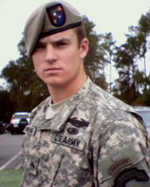Wanted: Lawyers to offer veterans a helping hand
By Diane Curtis
Staff Writer
By the time he was 22, Matthew Sanders had received four Army medals, including the Purple Heart, as a soldier with the Third Ranger Battalion in Iraq and Afghanistan. In all, the Kansas City, Mo., native who had joined the Army at age 18 following 9/11, was deployed five times in four years and was promoted to sergeant for his outstanding conduct.
 |
| Former Army Sgt. Matthew Sanders at Fort Benning |
Besides the Purple Heart, awarded for heroism to those who have been wounded or killed in combat, Sanders received the Army Commendation Medal, the Army Achievement Medal and the Joint Service Achievement Medal. He was trained primarily as a Squad Automatic Weapon (SAW) gunner, sniper and team leader. In five high-priority, dangerous combat missions, he helped rescue members of his team when their vehicle was hit with enemy grenades, helped gain control of a dam and hold it for 21 days, responded to an ambush that injured several team members, conducted covert infiltrations and site explorations, secured a downed helicopter while fighting the enemy and participated in a firefight in which 50 combatants were killed.
But then it went wrong. With one year left on his second three-year tour of duty, Sanders went AWOL.
“I was having marital problems. I was unable to cope,” says the 27-year-old veteran, now a student at Pasadena City College pursuing his dream to become a writer. “I wasn’t able to think clearly. I was making irrational decisions.”
Twenty-nine days after he disappeared, ashamed and sorry, he turned himself in. He was sent back to Fort Benning for another month, demoted and released with a general discharge, a less than honorable discharge that entitled him to some veterans’ benefits but not others, including the GI Bill.
Unfortunately, says Teresa Panepinto, legal director of Swords to Plowshares, the San Francisco organization that provides free legal representation, case management and advocacy to veterans, Sanders’ story is all too common. She sees many veterans who have joined the military at 18, seen very heavy combat and received high evaluations and then exhibit altered behavior and discipline problems, often as a result of Post Traumatic Stress Disorder (PTSD).
Those former servicemen and women desperately need legal help that is not readily available, mostly to upgrade their discharge or to change the scope of eligible benefits through administrative means. They also need legal help in other areas to deal with issues ranging from homelessness and domestic problems to foreclosure and criminal defense.
Gay and lesbian former military personnel who were discharged because of ‘Don’t Ask, Don’t Tell’ are included with those seeking to upgrade their discharges.
Sanders was lucky. After receiving a PTSD diagnosis three months after he was discharged, doctors at the Veterans Administration facility in Los Angeles led him to the Inner City Legal Center, which in turn hooked him up with Gibson Dunn & Crutcher lawyer Lora Cicconi, who wanted to help veterans on a pro bono basis. She and a colleague had two issues to deal with: benefits and discharge upgrade. Cicconi believes Sanders sped the benefits process himself and says she had to do little to get administrative approval to increase some basic benefits.
Upgrading his discharge took more work, including writing a seven-page brief that outlined his military heroism and accomplishments as well as his early, ignored signs of PTSD. In less than two months, the VA recommended that Sanders be honorably discharged.
 |
Los Angeles attorney Lora Cicconi helped Purple Heart recipient Matthew Sanders win an upgrade of his discharge and better benefits from the Veterans Administration.
– Photo by Stephanie Diani
|
But pro bono lawyers like Cicconi with the skills and credentials to deal with the VA are hard to come by, especially since a certificate and completion of special training is required to appear before the VA. In response, Jon Streeter, chair of the State Bar Board of Governors Stakeholders Committee, and board members Karen Goodman and Wells Lyman are working on an initiative to train and encourage attorneys to provide legal help to veterans.
“The idea is to use the bar as a clearinghouse for information about how pro bono services can be provided to veterans,” said Streeter. “This is a community of people who have, as part of their duty of citizenship, put themselves in harm’s way, and I think we’ve got a reciprocal duty to extend a helping hand.”
To encourage lawyer involvement, Goodman helped organize a free MCLE course May 6 with the Practising Law Institute (PLI) that meets the VA training requirements. The course, “Advocating for Veterans – the Basics on Benefits, Discharge Upgrades and Combat to Community,” will be held in San Francisco and by webcast and includes instructions on everything from an overview of government benefits and service-connected disability compensation to PTSD and military discharge upgrade and review.
“My hope is we can get good participation by lawyers who have a real commitment to helping the vets who have served our country so well. I know our rural areas have had a large number of people enlisted,” said Goodman.
Cicconi recommends such participation. The satisfaction she has received from helping Sanders and a woman in another benefits case is “immense.” Pro bono “is one of the things that makes being a lawyer special,” she said.
“Unfortunately, the need is greater than can be met,” said Swords to Plowshares’ Panepinto. The VA has a backlog of more than 1 million benefits claims, which take an average of 161 days to settle and three years to appeal. Swords to Plowshares receives e-mails, phone calls and snail mail from veterans around the country seeking help. “We’re definitely looking for more pro bono attorneys and hoping that attorneys all across the state will be interested” in the training, Panepinto said. A study has shown that veterans with legal representation are more successful in getting their claims approved. Swords to Plowshares, the only organization that helps with military discharge upgrades, has been successful more than 95 percent of the time, Panepinto said.
The legal work to advocate for benefits is not complicated, she added. “It’s similar to SSI work. “It’s administrative law. A lot of it is just knowing at what time you need to submit something.” But for people with no legal training, especially veterans who may be suffering with disabilities that affect their memory and ability to digest information, the obstacles can seem insurmountable. The bureaucracy is huge, Panepinto says. “It’s not a matter of ill will (on the VA’s part). There’s too much work and not enough people to do it.”
Bar board member Lyman, himself a Vietnam veteran, said he had problems adjusting when he came home after one deployment in a combat zone. “I started thinking of these people going back and forth, back and forth, and I don’t think anybody who has not been in the military understands the trauma to families, the psychological trauma to those who do it because you go through an entire emotional mental process to prepare yourself to go, and then to prepare yourself to come home. It’s very intense. I still recall that the last two weeks I was in Vietnam, I said, ‘Something’s going to kill me.’ To have these soldiers repeat that over and over, plus leave their families over and over and over . . .”
As frustrating as it was for Sanders to add benefits and upgrade his discharge, he has praise for the VA doctors. After he was discharged, he said, he was full of self-loathing. “I didn’t feel like I deserved the benefits. I was beating myself up. I had done wrong. I was a piece of crap.”
But with the VA doctors providing therapy and encouragement and Cicconi and her firm advocating for him, he “felt like I had these people who had my back.” Without that support, Sanders said, “I don’t think I would have had the fight in me” to seek an honorable discharge. And it wouldn’t have happened without Cicconi’s hard work and expertise, he added.
And as good as the benefits are, especially the GI Bill that is putting him through college, “what is even more important is I can tell people I have an honorable discharge.” It acknowledges, he adds, his performance and competence “in the 4 1/2 years prior to going crazy. That means a lot. I’d been invalidated with the fact that I didn’t have an honorable discharge.”